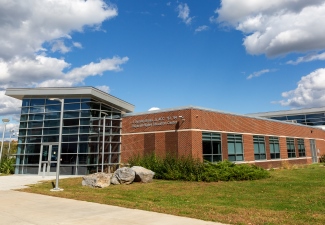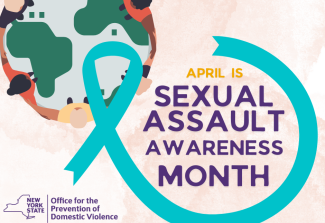Grant Expands Mental Health Support for SUNY Plattsburgh Students
Two new grant-funded services at SUNY Plattsburgh are expanding mental health support for students.
A federal $400,000 Higher Education Emergency Relief Fund grant will cover the cost for an evening mental health counselor, a psychiatric nurse practitioner and a Student Assistance Program.
The HEERF grant, which stems from the federal Coronavirus Aid, Relief and Economic Security Act, will fund the new services through October 2023.
‘Students Are Very Excited’
In addition to four full-time mental health counselors on campus, a fifth counselor from Behavioral Health Services North in Plattsburgh is on campus Monday and Tuesday evenings, offering therapy appointments as late as 8 p.m. at the Student Health and Counseling Center, said Christy Minck, assistant director of counseling services.
“I wanted to be able to offer services to students during non-traditional operating hours,” Minck said. “That has been very popular, and students are very excited about having evening opportunities for services.”
For 2022-2023, the new counselor will be able to see between 30 and 40 students. That’s on top of the up to 280 students who use individual counseling services each academic year.
“That might not sound like a lot, but when you’re a student who’s calling in desperate need of an appointment, and you’re able to get into that (evening) schedule and not have to wait, that means a lot because currently, the wait time for our counselors is about two weeks.”
A counselor meets with students experiencing mental health emergencies the same day the student contacts the Counseling Center.
Students experiencing a mental health emergency are seen that day by the counseling staff, Minck said. Students interested in taking medication to manage their condition are referred to a psychiatric nurse practitioner who is on campus one day a week, she said.
‘In-the-moment’ Support
Starting in mid-November, students can call the Business Health Services (BHS) Student Assistance Program at 800-327-2251 and speak to a master’s-level clinician called a care coordinator who will confidentially assess their issue and assist with any emergencies, Minck said.
Like on-campus counseling, students can use the Student Assistance Program if they are experiencing depression, anxiety, suicidal thoughts, burnout, anger, substance abuse, academic or career stress, homesickness, health or body image issues, or other difficulties.
Students can call 24 hours a day, seven days a week, for “in-the-moment” support and services, according to BHS, which is based in Baltimore and serves colleges around the country.
“They will create a plan with the student based on their phone assessment,” Minck said.
The plan may include connecting the student with college resources that can help with their unique situation, like academic personal training at the Learning Center or Student Support Services. Care coordinators will keep in touch with students to ensure they get the help they need, Minck said.
As part of their care plan, students may opt for confidential video or phone counseling with BHS’s licensed, master’s-level counselors. Faculty and staff can also call the Student Assistance Program to ask for help connecting students with resources or advice on addressing sensitive topics with students.
‘Supporting Academic Success’
Minck said the new services enable the Counseling Center to reach more students, which can be transformative for them.
“We know that there is a pretty strong connection between mental health issues and academic performance, so when we’re treating emotional issues, mental health issues, we’re really supporting the academic success of students and also helping to retain students,” she said.
The grant is also funding:
- Training in Reconsolidation of Traumatic Memories for three counseling center staff. RTM is a cutting-edge therapy to treat trauma disorders
- Mental health training for University Police
- Outreach activities in the Angell College Center like Fireside Fridays (cookies and cocoa served beside the Flynt Commons fireplace), a well-being speaker series, self-care programming and an outdoor movie series
- A student mental health peer educator who will organize mental health and wellness programming across campus
- A personal fitness peer educator who will teach small group classes in the Hood Hall fitness facility.
- Enhancements to the yoga/meditation room in Whiteface Hall and the interfaith prayer room in Moffitt Hall
- Improvements to the Counseling Center waiting room to make it more comfortable for students. New features include nature sound machines, a snack station, and plants with calming scents like sage and rosemary
The Student Assistance Program has a text option students can use for less urgent needs at 800-327-2251. Students who don’t need to speak with someone immediately can request assistance via the BHS app or through an online portal at portal.BHSonline.com.
Only some students experiencing difficulties may need counseling, while others may want to address their issues through individual skill-building, Minck said. The BHS app gives students access to more than 500,000 skill building and well-being resources.
The two new services are in addition to the counseling center’s existing services, which aside from individual counseling, include:
- Weekly group therapy sessions led by the college’s counselors: a therapy dog group, an art therapy group, and a leadership group. Group therapy topics may change each semester, Minck said
- Clinton County Canine Club therapy dogs visit the Angell College Center Thursdays from 5 to 7 p.m. through the end of the semester
- The Counseling Center organizes a Wellness Week each semester, which includes events like depression screening, therapy donkeys, meditation, Q&A with a counselor, and exercise classes
Follow @healthcounseling_sunyplattsburgh on Instagram for changes to meeting times and event announcements. For more information or to make a counseling appointment, students can call the Student Health and Counseling Center at 518-564-2187 or walk into the health center.
— Story, Photos by Senior Communications Specialist Felicia Krieg
News

SUNY Adirondack Students Benefit from New Dual Agreement with SUNY Plattsburgh Queensbury

SUNY Recognizes Two Plattsburgh Seniors for Excellence in Academics, Leadership
